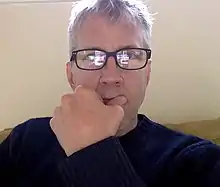Jc Beall
Jc Beall is an American philosopher, formerly the Board of Trustees Distinguished Professor of Philosophy at University of Connecticut.[2][3][4] As of late 2020 Beall holds the O’Neill Family Chair of Philosophy at the University of Notre Dame.[5]
Jc Beall | |
|---|---|
 | |
| Born | 1966 Portsmouth, NH |
| Alma mater | Princeton Theological Seminary (M.Div.) University of Massachusetts Amherst (Ph.D.) |
| Era | Contemporary philosophy |
| Region | Western Philosophy |
| School | Analytic philosophy |
Main interests | Logic, Philosophy of Logic, Analytic Theology |
Notable ideas | Dialetheism, Logical Pluralism, Contradictory Christology [1] |
Influences
| |
Work
Beall is best known in philosophy for contributions to philosophical logic (particularly non-classical logic) and to the philosophy of logic. Beall, together with Greg Restall (a Melbourne logician and philosopher), is a pioneer of a widely discussed version of logical pluralism,[6] according to which any given natural language has not one but many relations of logical consequence. Beall is also widely known for advocating a glut-theoretic account (see: dialetheism) of deflationary truth (Spandrels of Truth (2009)[7]).
Against the standard no-gap tradition in glut theory, also known as dialetheism (most famous in the philosopher Graham Priest’s work), Beall's early and post-2013 work advocates a gluts-and-gaps account of language, advocating not only the existence of truth-value gluts but also of truth-value gaps.[8][9] The adoption of both gaps and gluts distinguishes Beall from other researchers in a broadly dialetheist framework, who usually accept only gluts.
References
- "Journal of Analytic Theology". journals.tdl.org. Retrieved 23 July 2019.
- "Faculty". uconn.edu. Retrieved 11 December 2016.
- "CV" (PDF). entailments.net. Retrieved 17 February 2017.
- "Beall, J. C." worldcat.org. Retrieved 11 December 2016.
- "Department of Philosophy". nd.edu. Retrieved 10 January 2020.
- "Logical Pluralism". global.oup.com. Retrieved 5 February 2017.
- "Spandrels of Truth". global.oup.com. Retrieved 5 February 2017.
- "Transparent Disquotationalism" (PDF). entailments.net. Retrieved 5 February 2017.
- "There is No Logical Negation: True, False, Both, and Neither" (PDF). entailments.net. Retrieved 26 August 2017.
